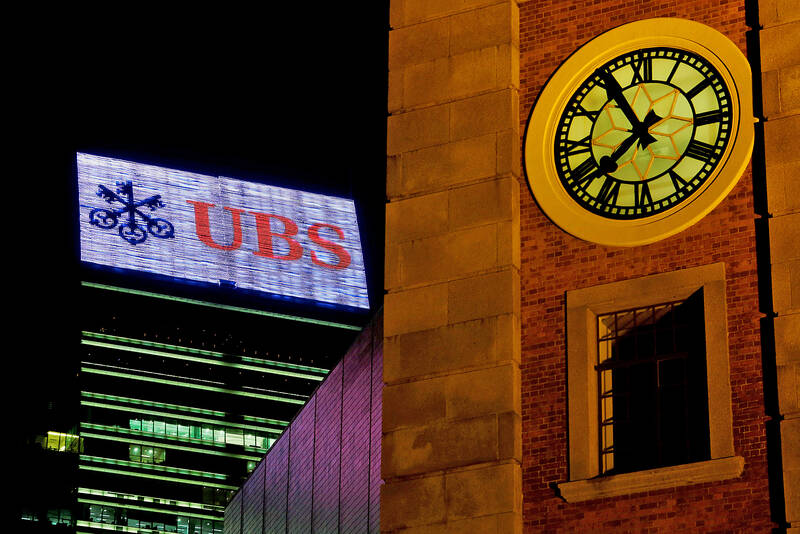UBS Group AG is letting go of half a dozen mainland China-focused employees in Hong Kong, as turmoil in the world’s second-largest economy hammers dealmaking, prompting global banks to rein in their presence in the once lucrative market.
The Swiss bank has trimmed bankers in businesses including debt capital markets, investment banking and real estate, the people said, asking not to be named discussing private information. A UBS spokesman declined to comment.
Investment banking revenue for UBS in China has plunged by about half, although gains in Japan and Australia helped prop up its overall Asia business, people familiar said.

Photo: Reuters
New issuance in debt and equity markets has slowed this year following sweeping policy changes in China and slowing economic growth, denting revenue at banks that had ambitious expansion plans for the country.
Rival Credit Suisse Group AG, saddled by major losses, is also preparing large cuts to its investment banking unit and is questioning its long-term plans for China amid slowing growth and geopolitical tension.
Global investment banking revenue at UBS tumbled 57 percent in the second quarter during what chief executive officer Ralph Hamers said was one of the most difficult periods for investors in a decade.
In Asia, UBS has been focused on the sale of Chinese junk bonds to wealthy clients, a business that has almost evaporated as Chinese property developers remain largely shut out of the market amid a deepening property crisis.
Investment banks had been going full steam into China as Beijing opened the door to full ownership of their ventures in the country, counting on reaping billions in profits. UBS boosted its stake in its China securities venture to 67 percent in March after its mainland China revenue had more than doubled to almost US$1 billion last year from 2019.
Now they are facing rougher markets. Offshore bond sales by Chinese firms have slid 44 percent this year to US$63.9 billion, data compiled by Bloomberg showed.
Defaults by property firms including giants in the offshore market such as China Evergrande Group (恆大集團) and Kaisa Group Holdings Ltd (佳兆業集團) have dented investor appetite.
UBS has plunged in the league tables of dealmakers in China offshore bonds, falling 24 places to rank 42nd. The Swiss bank is ranked 45th for Asia high-yield bonds denominated in US dollars, euro and yen, slumping 38 places so far this year, the data showed.
The job cuts at UBS also come as China steps up scrutiny of companies seeking to sell debt abroad as defaults worsen to record levels.
Borrowers, including financial firms, need approval from the Chinese National Development and Reform Commission for issuance of debt with maturities longer than one year, a draft for comments revealed on Friday last week showed. The consultation period runs until Sept. 26.

Hon Hai Precision Industry Co (鴻海精密) yesterday said that its research institute has launched its first advanced artificial intelligence (AI) large language model (LLM) using traditional Chinese, with technology assistance from Nvidia Corp. Hon Hai, also known as Foxconn Technology Group (富士康科技集團), said the LLM, FoxBrain, is expected to improve its data analysis capabilities for smart manufacturing, and electric vehicle and smart city development. An LLM is a type of AI trained on vast amounts of text data and uses deep learning techniques, particularly neural networks, to process and generate language. They are essential for building and improving AI-powered servers. Nvidia provided assistance

DOMESTIC SUPPLY: The probe comes as Donald Trump has called for the repeal of the US$52.7 billion CHIPS and Science Act, which the US Congress passed in 2022 The Office of the US Trade Representative is to hold a hearing tomorrow into older Chinese-made “legacy” semiconductors that could heap more US tariffs on chips from China that power everyday goods from cars to washing machines to telecoms equipment. The probe, which began during former US president Joe Biden’s tenure in December last year, aims to protect US and other semiconductor producers from China’s massive state-driven buildup of domestic chip supply. A 50 percent US tariff on Chinese semiconductors began on Jan. 1. Legacy chips use older manufacturing processes introduced more than a decade ago and are often far simpler than

STILL HOPEFUL: Delayed payment of NT$5.35 billion from an Indian server client sent its earnings plunging last year, but the firm expects a gradual pickup ahead Asustek Computer Inc (華碩), the world’s No. 5 PC vendor, yesterday reported an 87 percent slump in net profit for last year, dragged by a massive overdue payment from an Indian cloud service provider. The Indian customer has delayed payment totaling NT$5.35 billion (US$162.7 million), Asustek chief financial officer Nick Wu (吳長榮) told an online earnings conference. Asustek shipped servers to India between April and June last year. The customer told Asustek that it is launching multiple fundraising projects and expected to repay the debt in the short term, Wu said. The Indian customer accounted for less than 10 percent to Asustek’s

Gasoline and diesel prices this week are to decrease NT$0.5 and NT$1 per liter respectively as international crude prices continued to fall last week, CPC Corp, Taiwan (CPC, 台灣中油) and Formosa Petrochemical Corp (台塑石化) said yesterday. Effective today, gasoline prices at CPC and Formosa stations are to decrease to NT$29.2, NT$30.7 and NT$32.7 per liter for 92, 95 and 98-octane unleaded gasoline respectively, while premium diesel is to cost NT$27.9 per liter at CPC stations and NT$27.7 at Formosa pumps, the companies said in separate statements. Global crude oil prices dropped last week after the eight OPEC+ members said they would